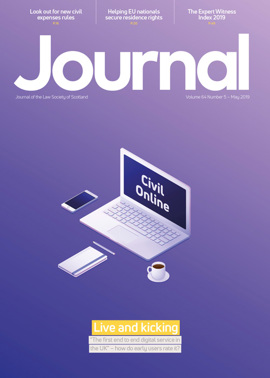Sign up – log in – action!

It’s the first end-to-end digital service in the UK, and we’re immensely proud of it.” Thus Kay McCorquodale, Scottish Courts & Tribunals Service’s Chief Development and Innovation Officer, describes her baby, the Civil Online system for simple procedure actions, now enjoying its first weeks of live action.
Gestation was rather protracted. Operative since late 2016, simple procedure was designed with online functionality in mind, but first came the integrated case management system (ICMS), the back office system in use across the sheriff courts, the All Scotland Personal Injury Court and the Sheriff Appeal Court since autumn 2016. Civil Online first emerged in its own right early last year as a simple case tracker, was then enhanced to allow access to court documents, and finally on 25 April 2019 came the launch of the service that enables a simple procedure claim to be run (and defended) from start to finish online.
McCorquodale does not regret the time spent in development. “Civil Online is a bespoke system: we’ve had to develop an online system within the confines of the Simple Procedure Rules and forms. That was challenging, as you’ll know if you know the extent of the rules themselves, and led to a review of the rules and forms which is ongoing at the moment.” Discussions with solicitors, judiciary and SCTS staff who tested it also led to changes, “but that meant we had a successful system to launch in April based on that feedback”.
On the button
So what does it involve? One notable feature is its ease of access for party litigants and lay representatives, who can simply go to the SCTS website using a phone, tablet or other device, and click on a button. Already in the first week SCTS was recording cases being submitted over the weekend, which as McCorquodale observes, illustrates enhanced access to justice. Help is at hand through links to the rules and guidance, FAQs, and if necessary by contacting the court.
Legal representatives have to register first, to allow them to manage multiple cases online – and so far more than 700 solicitors’ firms have signed up. Once registered and logged in, they can submit claims and response forms, lodge evidence, pay court fees and view electronic documents in their cases online. “We do appreciate that not everybody is able to access the digital service, so the traditional paper claims will continue as well,” McCorquodale assures us.
Once a case is up and running, the procedure is exactly the same: it is open to the sheriff to decide the case on the papers or call parties and hear representations. “If necessary there would still be a hearing in open court, but the main point is that parties would still be able to access documents online, as will the sheriff, and evidence can be presented digitally within the court on screens,” she explains. “For simple procedure cases that go to case management and hearings etc, the sheriff has exactly the same powers.”
User experiences
What has early experience been like for solicitors using the system? Two firms who were involved in the development stages lodged the first claims immediately prior to general launch.
David Alexander, head of debt recovery at Gilson Gray, received his case back registered and timetabled 15 minutes later. Over the following week, “How long it takes depends what court you are submitting to – if it’s one of the quieter courts, the quickest we have had is about 20 minutes. Generally our experience is up to about a two-hour turnaround; we’ve had a few longer waits with regard to the busy courts but nothing major. It is a slight concern I have: once we are three to six months in and there are more users, I suspect in the busier courts the turnaround time will start to drift upwards. But it’s something we’re keeping an eye on.”
That apart, he is impressed with the simplicity and speed of the system. The quick turnaround “automatically saves us three or four days up to two or three weeks, again depending on the court”, and since for a debt recovery operation time is of the essence, “it’s a massive help to me and my team”.
McCorquodale explains that SCTS is expecting a steady uptake of users as solicitors become familiar with the system and the time-saving process. While Civil Online is not designed to integrate with firms’ own case management systems, that has not deterred Alexander. “It causes a bit of duplication in the work we carry out at our end, probably adding about five minutes, maybe 10 maximum, to one of my paralegals’ time in setting up and submitting an action. But that is one of the main improvements I expect SCTS will be working on.”
He adds: “For the first month we’re submitting everything online; I’m keeping a note on timescales, so I can do comparisons with regard to whether it is taking longer, is it going to be worthwhile, but seven days in, my team are already submitting actions a lot quicker than day 1 or day 2, so I suspect it’s not going to deter me from sticking with the online system. Time will tell.”
Similarly, Tracey Campbell-Hynd, principal of Hamilton practice TCH Law, a small firm with a sizeable practice in debt recovery and other claims, sees clear benefits even without the system being able to speak to her own one. “In terms of being able to submit a claim online, it certainly does what we would expect, and it was relatively quick and simple to go through the process. Where it could do with some development is maybe for volume cases like we have, but I do believe there is going to be integration at some point in the future.”
A “self-confessed lover of technology”, she continues: “I want to try and use the system because of the speed of being able to get your claim submitted, and certainly last week when we were submitting our first claim we got our warrant within hours. In the bad old days you were waiting for a week. So I’m in the process of looking at how we can integrate our system as quickly as possible into the new Civil Online. It doesn’t have the full functionality yet, but we are a paper-light office.”
A minor grumble for her is the somewhat drawn-out procedure for logging in, which includes an emailed link to follow before you enter your password, “but once you get in, it’s very simple”.
Both solicitors also agree that the “smart” online claim form is a great benefit: being taken to the next relevant question saves time compared with wading through an 11-page paper form. And considerable savings on paper and postage follow, bringing welcome environmental benefits, Alexander observes.
Looking ahead
What would they like to see next? Both are keen to see the special forms of simple procedure claim such as housing and personal injury actions finally brought into force and made available online, and look forward to the day when the system extends to other types of procedure, while recognising that that remains some way off.
Asked about next steps, McCorquodale explains: “The Scottish Civil Justice Council has recently carried out a review into the existing Simple Procedure Rules and we expect that changes will be made to those rules. That will mean changes to ICMS and Civil Online, to the forms on the system. So it would be premature to bring the Simple Procedure Special Claims Rules into force, until we get the basic forms correct.”
She notes: “Around 35,000 simple procedure cases are submitted each year, which represents a third of all cases registered by the sheriff courts, and once special claims are introduced this will be half of all civil cases.
Civil Online sets out our digital ambitions quite clearly and what we are doing now is focusing on Court of Session work, because we are going to replace the existing Court of Session case management system with ICMS, starting with personal injury cases, as we did with the sheriff court in 2016. We’re also committed to continuous improvements to Civil Online taking account of users’ experience of the system.”
That user engagement is “absolutely fundamental to the development work that we do”, and means “a lot of interaction with the legal profession and our own court staff and the judiciary”.
Before the Civil Online launch, SCTS held a series of roadshows for staff as well as professional users, and now that it is live, “We’re really keen to get feedback from anyone who’s using the system, and your readers can help with that so please drop us a line at civilonline@scotcourtstribunals.gov.uk and we will take the comments on board. And if you haven’t used it yet, please give it a try and get the benefit of the time savings which using Civil Online brings.”
The willingness to make things work is reciprocated. “There are improvements that need to be made to the system, but they’re all pretty minor when you compare it to what we’re now doing, which is a proper online court system,” Alexander remarks. And Campbell-Hynd confirms: “We’ll make it work, whether or not it’s going to be a perfect result for now. We’ll certainly make it work.”
In this issue
- Claiming under the advance payment scheme
- Time for a written constitution
- New form F9: worth the wait?
- Wedded to a matrimonial property regime
- Brexit divorce set to increase UK's “skype families”
- Corporate personality: Justice v Doctrine
- Reading for pleasure
- The Law Society of Scotland Expert Witness Index 2019
- Opinion: Judith Robertson
- Book reviews
- Profile: Michael Clancy
- President's column
- Is your legal data being held to ransom?
- People on the move
- Sign up – log in – action!
- Frozen out?
- Taxing times for litigators
- DNA analysis: when research just isn’t enough
- Brexit focus: EU citizen settlement remedies
- Why employers should report on wellbeing
- 3% – and then what?
- 1,000 days of mediation
- Barred from acting
- To name or not to name?
- Enter the “What I Think”
- Fixed penalties and fair trials
- Auto-enrolment: keeping employers on their toes
- Scottish Solicitors' Discipline Tribunal
- Vulnerable accused: a need for knowledge
- Burdens and who can enforce them
- Convener’s final bow
- Public policy highlights
- TCSP review update
- Westminster: answering the call
- Accredited paralegal practice area highlight: family law
- Accredited Paralegal Committee profile
- Nyona named star paralegal
- Ask Ash
- Moving nightmares part 2
- Complaints: seeking consistent practice
- Morally bankrupt?
- For the elderly: how SFE works
- Standing up to challenge






